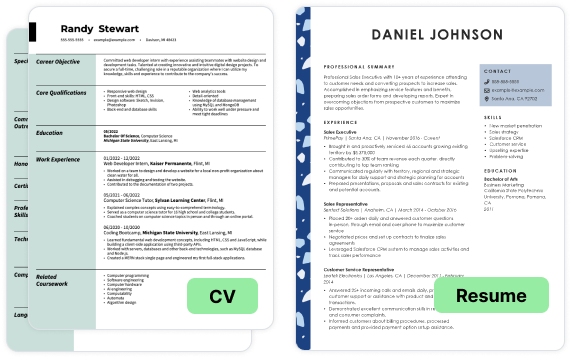One of the most common questions job seekers have is, “What is a CV versus a resume?” While both documents are used to apply for jobs and contain information about your academic and professional background, there are some differences. Here we will cover the following:
- CV vs resume: What’s the difference?
- What to include in a CV and who should use one.
- What to include in a resume and who should use one.
- CV vs resume differences in the U.S. and Europe.
- FAQ about the differences between CVs and resumes.
CV vs Resume: What's the Difference?
Wondering what the difference is between a CV and a resume? The answer is simple: it depends on where you live. In the United States, a resume is a shorter summary of your work history and skills, whereas a CV or “curriculum vitae” is a more detailed history of your accomplishments, including academic history and publications.
In the U.S., only candidates in academic, legal, scientific and medical settings need a CV. For everyone else, a resume is preferred.
In Europe, a CV is used the same way as a resume. So an American resume might be called a CV in another country. But both are shorter and more focused on relevant career details than an academic CV.
The best way to understand the difference between a CV and a resume is to make a CV of your own. Study the examples below to see how the two documents compare, or study our library of CV examples and resume examples to learn more.
What to Include in a CV and Who Should Use One
CVs offer a lot of variety and many choices in terms of which sections the job seeker should include. Some are required and others are optional. What you include will depend on your experience level and the role you're applying to.
Here are 11 sections to consider when learning how to write a CV:
Curriculum Vitae sample
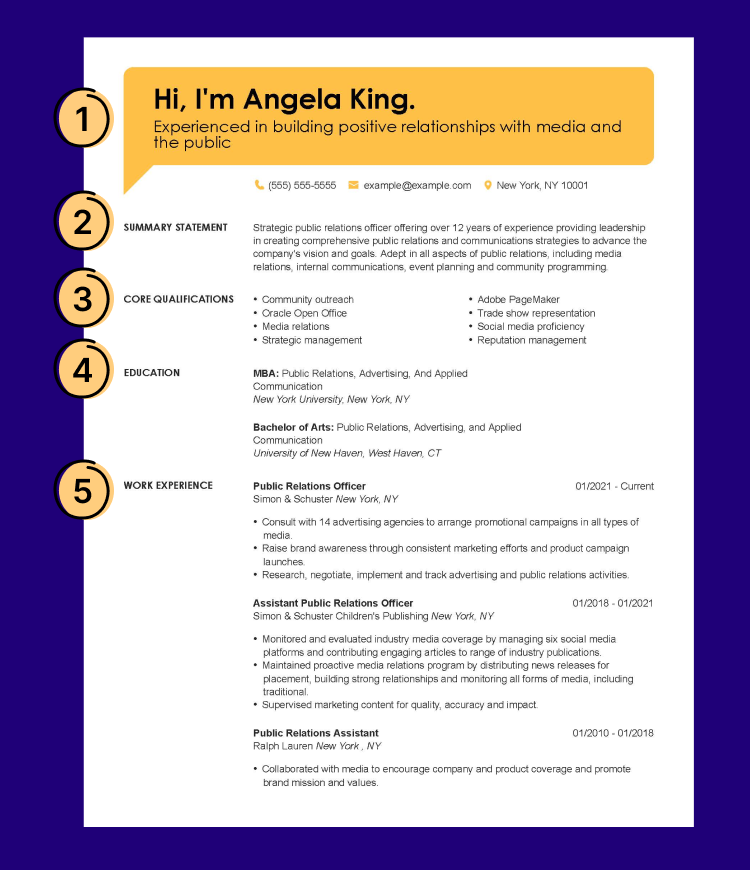
Required CV sections:
- 1
Contact information:
Include your name and contact information here. Including your complete mailing address is no longer necessary, but your location is, so be sure to add your city and state.
- 2
Summary statement:
A professional summary should consist of three to five sentences that offer a high-level glimpse into your most relevant skills and your top professional achievements.
- 3
Core qualifications:
Use bullet points to highlight your unique skills, specifically as they relate to the role you seek. Don’t forget to include a mix of hard and soft skills in this section.
- 4
Education:
Education often takes a high-profile role on a CV. Since CVs are usually used in industries like the sciences, law, medicine and academia — which require higher education — you’ll want to list your degrees after high school only.
- 5
Work experience:
Here, make a reverse-chronological list of your past employers, starting with your most recent or current role. For each, add job titles, dates of employment and location. Also for each, add bullet points that explain your job responsibilities and include at least one quantifiable metric that shows the impact of your work.
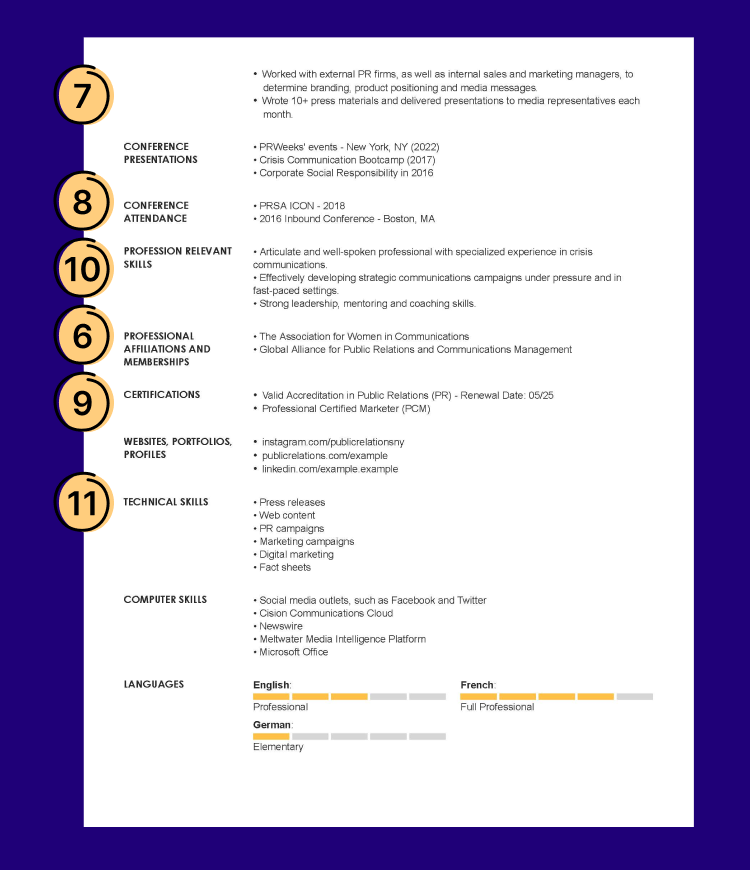
Optional CV sections:
- 6
Affiliations:
Add this section to highlight the industry-relevant associations you belong to.
- 7
Awards:
If you’ve won any professional or academic awards that are relevant to the job you’re applying to, list them here.
- 8
Grants and fellowships:
This section is most common in fields like academia, medicine or law, where you might receive a grant or a fellowship. Add this to show that your work is valued and backed by your field.
- 9
Certifications and licenses:
List any relevant professional certifications or licenses you have earned here.
- 10
Conferences:
In some fields, it’s common to list the conferences you’ve attended. This is especially important if you have given a lecture, a keynote, or presented your work or research.
- 11
Publications:
If you have written articles or research papers that have been published, list them here. The same goes for published works of fiction, nonfiction, poetry and other books.
Who should use a CV?
In the U.S., CVs are used primarily when applying for positions in academia, sciences, medicine or law.
What to Include in a Resume and Who Should Use One
Resumes have five standard sections. However, as you learn how to write a resume, you’ll learn that, like CVs, there are other sections you can opt to use. Which sections you choose will depend largely on whether you use a chronological, combination or functional resume format.
You can learn more about which one is right for you by reading our page on resume formats. For more information about how to incorporate optional resume sections, review one of our resume examples for the job title you seek.
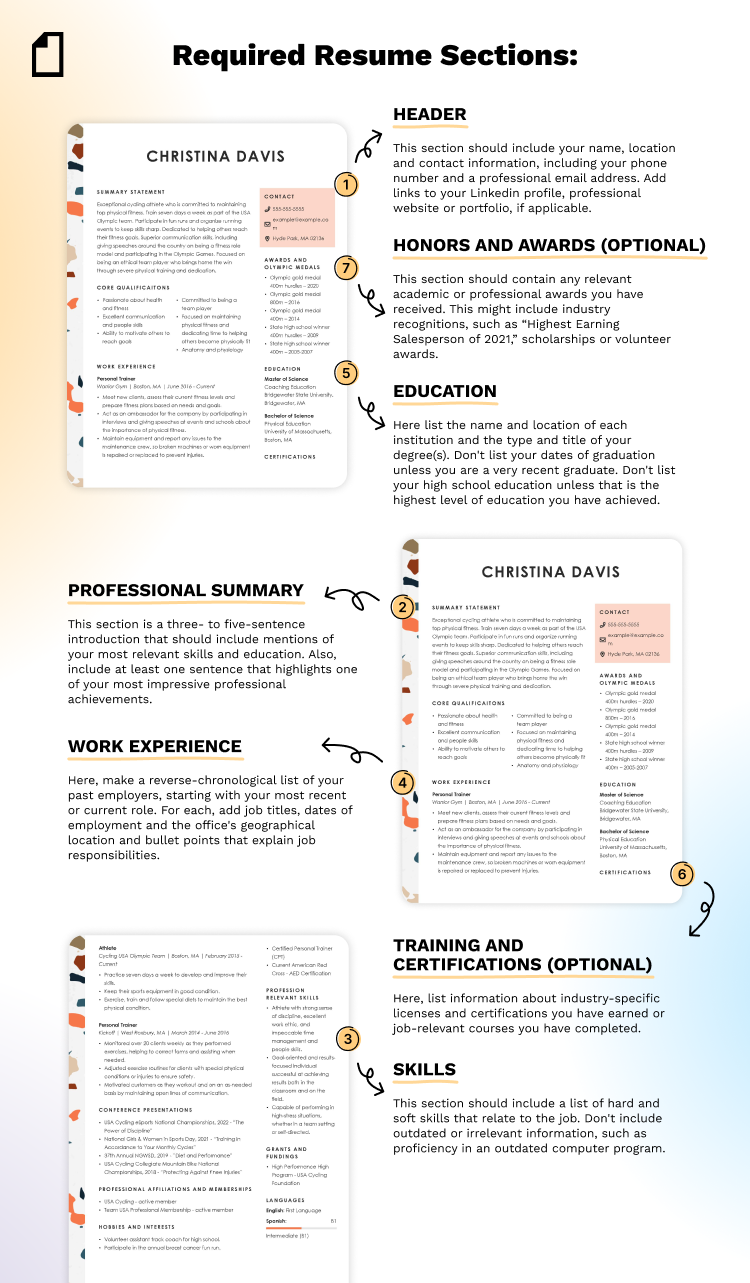
Who should use a resume?
In the U.S., resumes should be used by almost every job seeker, regardless of industry or experience level.
CV vs Resume: Differences in the U.S. and Europe

Now that we have gone through all of the differences in the structure and uses for CVs and resumes, we will look at the differences by geographical location for each.
In Europe, the word CV is a synonym for the document that we in the U.S. call a resume. So, as an American, if you are applying for a job anywhere in Europe and are asked to forward your CV, what the hiring manager is really asking for is your resume.
However, here in the U.S., there is a big difference between an employer asking for a CV vs a resume. Again, most job seekers will want to use a resume, but applicants in some fields, including the sciences, academia, law or medicine will want to prepare a CV.
A CV is used in academic settings because it is a longer and more comprehensive document that gives you space to outline your key achievements on top of your relevant work experience.
CV vs Resume FAQ
Whether you choose a resume or a CV will depend on the industry and the role you seek. The vast majority of job seekers in the U.S. will want to choose a resume. However, those job seekers who are applying for work in academia, the sciences, law or medicine should choose to write a CV.
No. In the U.S., CVs and resumes are different documents and have different uses. However, if you are an American who is applying for work in Europe and you are asked to send the hiring manager a CV, what they actually mean is to send in your resume.
In the U.S., CVs are used primarily by job seekers who are applying for positions in academia, sciences, medicine or law. All other job seekers should choose a resume.
While not required, it is highly recommended that you include a professional summary in your CV or resume. This provides a brief overview of your most important qualifications, making it easier for hiring managers to see what skills and experience you offer. Additionally, it provides an opportunity to highlight keywords from the job description to make your CV or resume better suited for applicant tracking systems (ATS). If you need help writing your summary, then check out our AI Resume Summary Generator, which will quickly put one together for you.
Yes, Resume Now offers a wide selection of both CV templates and resume templates. Our Resume Builder contains a library of designs for professionals in a range of fields.
Was this information about CV Vs Resume: What Is The Difference? helpful? Let us know!
Heather is the Content Strategy Manager for Resume Now and a Certified Professional Resume Writer (CPRW) with more than ten years of experience writing about job search and career topics. She is based in San Francisco.
More resources

15 Latest Resume Trends for 2026 + Examples
Learn how these 15 current resume trends for 2026 can help you...

AI-Resistant Careers Index 2026: 20 Jobs That AI Can’t Replace
Resume Now s latest report breaks down the most AI-proof caree...

60% of U.S. Workers Expect AI to Eliminate More Jobs Than It Creates in 2026
Resume Now s newest report shows growing concerns about the im...
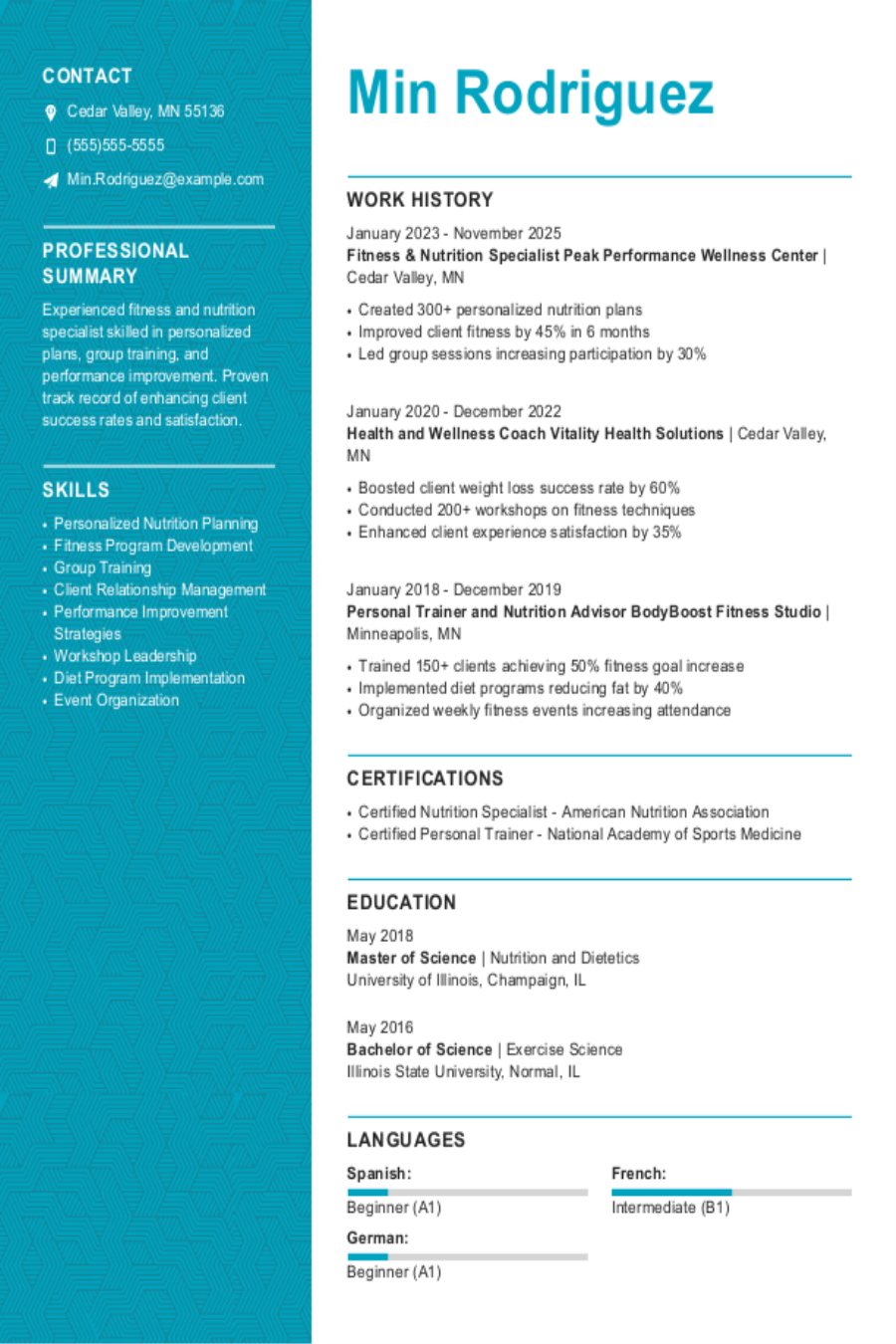
Interview-Winning Fitness and Nutrition Resumes Examples and Tips
As a fitness and nutrition professional you need a resume tha...

Interview-Winning Film Resume Examples and Tips
As a film professional you need a resume that captures the cr...

Fashion Resume: Examples & Templates
As a fashion professional you need a resume that captivates p...

